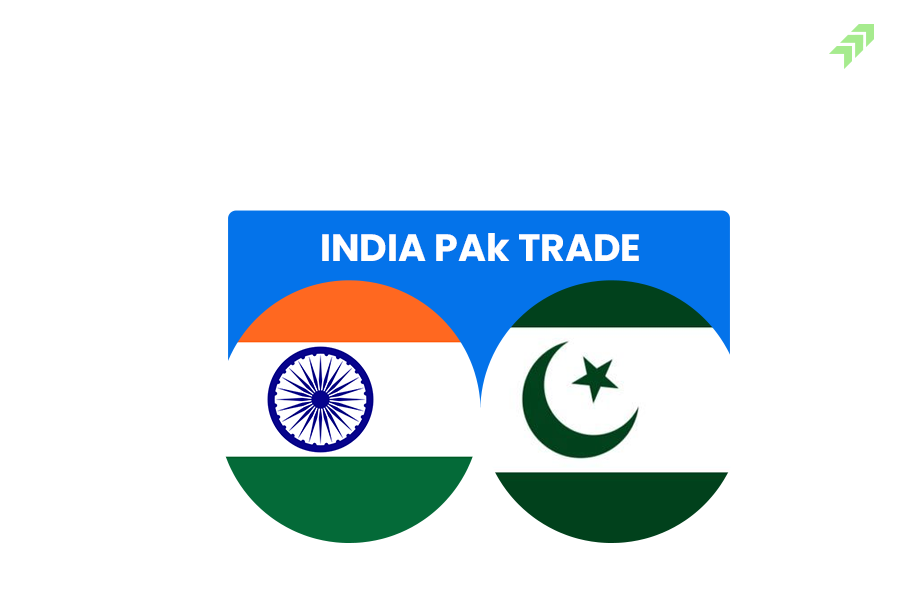The political and military tension influenced trade relations between India and Pakistan and current changes have brought fragile economic ties of both countries to the edge. After the Pahalgam terrorist attack that killed 27 tourists on April 22, 2025, India fought back with strong diplomatic measures against Pakistan which included suspending the Indus water treaty, halting visas for SAARC exemption, and importantly shutting down key travel & bilateral trade links. If we look at past trade of both countries they were trading partners and over 60% of India's exports went to Pakistan in 1948-1949. The continuous cross-border actions and wars between countries including the Kargil war, the 1965 conflict, and the Pulwama attack significantly contributed to weakening trade relations. This consistent filtration affects bilateral relations due to this in 2019 India revoked Most Favored Nation (MFN) status from Pakistan and imposed a 200% import duty on Pakistan goods which halted trading. In the current fiscal year 2025, India exported $447.65 million to Pakistan and imported marginally. The trade partnership between countries is not converted into meaningful economic engagement because of political instability, national security concerns, and reciprocal tariff measures.
What Goods Are Traded Between Countries?
The political and security tension have significantly reduced trade between India and Pakistan but there is still involvement in exchange for several key goods. In the year 2023, India exported goods to Pakistan approximately worth $523 million. The main goods exported included Pharmaceutical products ($105 million), Organic chemicals ($140 million), and Sugar & sugar confectionery ($66 million). Other than these main goods India also exported food-related items like poultry feed, dry fruits, and vegetables, along with auto parts, textile, and machinery goods. The export of these goods from India represents the dependency of Pakistan on India for industrial and essential goods. The trade between India and Pakistan has sharply declined from $3 billion in 2024 and $ 1.2 billion in 2024. India exported only $500 million of goods to Pakistan in period of April 2024 to January 2025. In total exports of India total contribution of Pakistan is $627 million which is 0.1% of India's exports and imports from Pakistan were minor 0.003%.
India and Pakistan Trade Over the period
On the other hand, there are only a few items that India imports from Pakistan and these goods have negligible contribution to Indian imports. The goods that India imports from Pakistan are toys, cotton, dry fruits, plastics, electronic items, machinery & boilers, and other commodities goods including rock salt and handicrafts which are niche market goods. There is no reliance on Pakistan goods which exported to India and these goods are minimal in imports of India. The total goods that India imported from Pakistan were around only $3 million in FY 2023-24, a sharp fall from $488 million in FY 2018. The total contribution of Pakistan to Indian imports is only 0.003% which is negligible and can easily be replaced by alternative sources.
Impact on Both Countries
The instability of trade between India and Pakistan has a different impact on both countries. In this trade clash, Pakistan will suffer more and could face serious & adverse consequences for its economy. The dependency of Pakistan on India is significantly higher in comparison to India because essential goods are imported by Pakistan from India, including organic chemicals, pharmaceuticals, vegetables, and poultry feed. After the pause on trade between both countries, it will create a shortage of critical goods mainly in the healthcare & agriculture sectors because Indian products are easily accessible and affordable for Pakistan consumers. If Pakistan tries to replace these Indian goods with other countries such as Gulf nations and China it will cost more and create an extra burden on Pakistan's financial condition, it will create economic instability and fall in foreign exchange reserve of Pakistan. Other than this, industries in Pakistan such as manufacturing and textiles is dependent on Indian raw materials, after the trade blockage industries in Pakistan will suffer from operational challenges. The major disruption or problem will be faced by normal consumers of Pakistan who face unavailability of daily products like medicines, spices, and personal care products.
On the other side, blockage of trade with Pakistan has negligible impact on India. The total volume of exports from India to Pakistan is minimal around 0.1% and imports from Pakistan are less than 0.003% of total India imports. It means that the trade block from Pakistan does not create any serious economic loss for India, but oppositely it gives India a diplomatic and strategic advantage over Pakistan. In India loss from Pakistan imports is minor and it will affect certain Indian businesses near the border that rely on cross-border trade. This trade freeze plays a role in soft diplomacy for India.
In short, disruption in trade for both countries has deepened on political and economic divide in the two nations. In Pakistan, trade disruption will make their economy more depressed as it is already fragile. Meanwhile, for India, this trade stoppage will play an important role in Indian diplomacy because India is not dependent on Pakistan for goods and this move is a calculated response of India to Pakistan.
Grey Trade between India and Pakistan
The official trade data shows goods of $447.65 million are exported by India to Pakistan. However, the real trade between both countries is higher than $10 billion a year according to the Global Trade Research Initiative (GTRI) which is Indian based think tank. This unofficial trade makes a large difference in trade numbers for both countries. It is an unofficial trade that takes place through bypasses direct routes. In this unofficial trade, traders send goods to other third countries such as Sri Lanka, Singapore, and UAE then they store them in the warehouses of these countries where they change packaging & documents to show the different countries and export to Pakistan. In this process no storage duty is charged on stored goods, to avoid trade restrictions and gain higher profit keeping the trade continues.

















